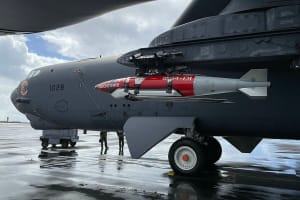Israeli officials reportedly concerned over potential US concessions in nuclear talks with Iran
Defense officials fear a mediocre deal could limit Israel’s ability to strike Iranian nuclear facilities

Israel has been closely monitoring the nuclear talks between the United States and Iran, with officials expressing deep concern about the negotiations with the Islamist regime over its nuclear program, according to reports in Israeli media.
The assessment of some Israeli analysts is that U.S. President Donald Trump could be eager to make a deal with Iran, even one that doesn’t completely dismantle the Iranian nuclear weapons program, in order to burnish his reputation as a dealmaker, according to Ynet News.
Some officials believe Iran may propose closing or destroying some of its nuclear facilities – without fully dismantling its nuclear weapons program – in an attempt to present Trump with a perceived diplomatic victory.
While Israel is not directly participating in the negotiations, it has a vital interest in their outcome due to Iran’s repeated threats against Israel and its ongoing support for terrorist organizations such as Hamas and Hezbollah.
Israel is convinced that the threat of military action, including the reinforcement of U.S. troops and capabilities in the region, along with the attacks on the Houthi rebels, was influential in bringing Iran to the negotiating table. However, there is some concern that the United States may not have the stamina for long, difficult talks.
While Israeli Prime Minister Benjamin Netanyahu expressed his interest in a Libya-style deal, very few Israeli officials believe such an option is possible with Iran’s nuclear program.
Unlike Libyan dictator Muammar Gaddafi, whose primary interest in a nuclear weapon was political, the Iranian regime appears to be driven by strong ideological motivations in its pursuit of nuclear capabilities.
Additionally, Gaddafi’s surrender of his nuclear program later left him more vulnerable to foreign interference, which led to his overthrow and death at the hands of Libyan rebels during the Arab Spring.
Iran likely views total surrender on the nuclear weapons issue as a red line – viewing the program as essential to ensuring the regime’s long-term survival.
There is also concern that Trump, now serving his second term, won’t be able to enforce any deal negotiated, no matter how strict, once he leaves office.
However, there are fears that the administration succeeding Trump might not be as sensitive to Israeli concerns, particularly regarding support for a potential military strike on Iran’s nuclear facilities.
Following the IDF's retaliatory strikes on Iran in October 2024, Israeli defense officials said the country had a unique window of opportunity for a disabling attack on Iran’s nuclear sites, due to the elimination of the majority of Iran’s air defense systems, especially the Russian-made S-300 anti-aircraft systems.
Given previous tough talk from Trump during his campaign trail, many of those officials hoped he would back either a joint U.S.-Israel strike or would at least green light an Israeli strike.
Some Israeli officials also point to the talks between the United States and North Korea during Trump’s first term, which were accompanied by bold statements by Trump, but achieved little practical impact on North Korea’s nuclear program.
A deal that only partially restricts or delays Iran’s ability to develop nuclear weapons is a red line for Israel. However, if such a deal were made, the U.S. would likely prevent Israel from launching an attack on Iranian nuclear facilities.
Meanwhile, U.S. Defense Secretary Pete Hegseth appears to be maintaining pressure by keeping up the threat of a military option.
During an interview with Fox News on Saturday, Hegseth said Trump is “dead serious that Iran cannot have a nuclear weapon.”
“He's dead serious that he wants it done at the negotiating table, he wants it done peacefully, and that's why he's going straight to these talks, he's set that deadline,” Hegseth stated.
“But he's also dead serious that if we can't figure this out at the negotiating table then there are other options to include my department to ensure that Iran never has a nuclear bomb,” Hegseth added, while mentioning the U.S. strikes on the Houthis in Yemen as an example of the U.S. using force.
“We hope we never get there, but what we're doing with the Houthis and what we're doing in the region, we've shown a capability to go far, to go deep, and to go big.”

The All Israel News Staff is a team of journalists in Israel.
You might also like to read this:

















